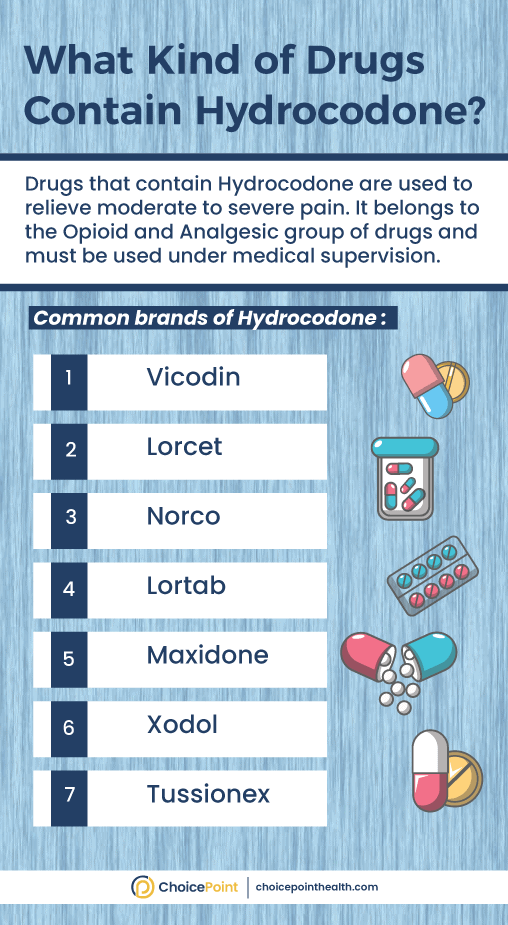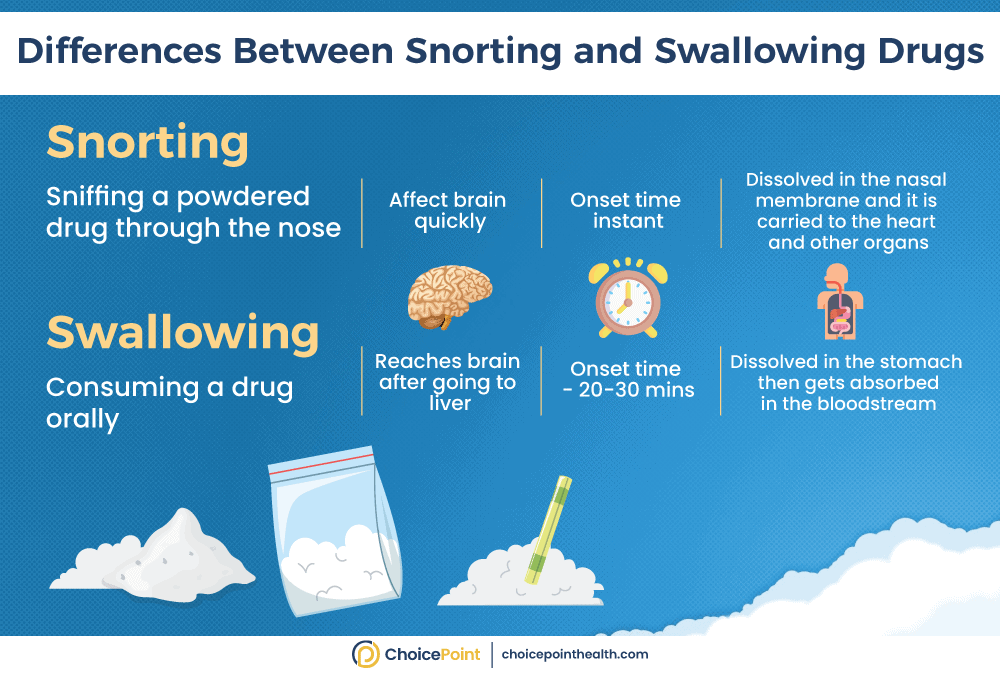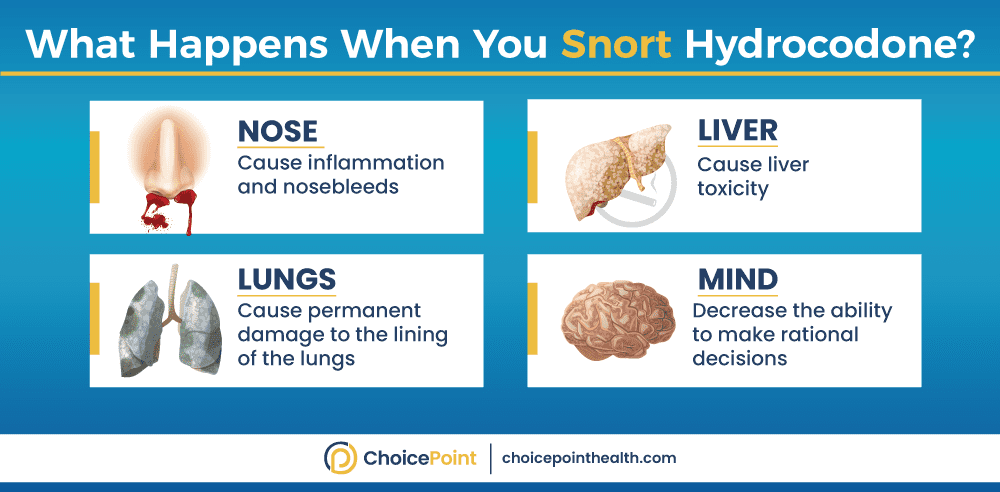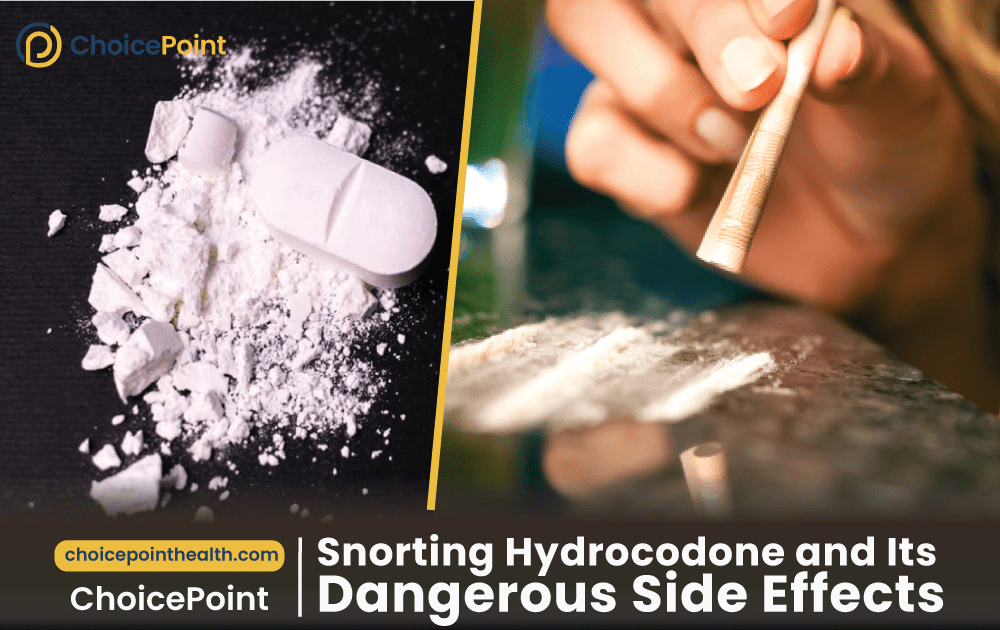Hydrocodone is hands-down the most frequently prescribed opioid medication in the US. As a result, it is the most abused drug, having acute addiction potential. In 2016, the National Survey on Drug Use and Health (NSDUH) concluded that; 6.9 million people aged 12 and older in the United States abused hydrocodone the previous year. According to the survey, Hydrocodone abuse decreased significantly, from 6.9 million to 5.5 million people in the United States in 2017 and 2018 respectively. In this article, we aim to cover what is Hydrocodone, what is Hydrocodone used for, the dangers of snorting Hydrocodone, its side effects, and treatment options for people who have indulged themselves in the bad habit of snorting Hydrocodone.
Table of Contents
What Is Hydrocodone?
Hydrocodone is a pain-relieving, semisynthetic, easily accessible opioid with a high potential for abuse and dependency. This drug falls into the category of Narcotic Analgesics. It acts on the central nervous system.
Hydrocodone is an active ingredient in Vicodin and Hysingla ER. It is normally dispensed as a combination of acetaminophen/hydrocodone or ibuprofen/hydrocodone. Hydrocodone-the painkiller is available in tablets that can be consumed orally or as prescribed by the doctor. They are sold under different brand names, such as Norco or Vicodin.
Why Is Hydrocodone Prescribed?
Hydrocodone changes the pattern of how our brain responds to pain and produces a feeling of relief. The effects of Hydrocodone are similar to other opioids like morphine or oxycodone.
Hydrocodone is used as a strong painkiller, and it is prescribed to:
- treat acute or chronic pain
- help reduce the pain after dental surgery
- reduce the pain after injuries
- the patients who can not manage the discomfort without the necessary painkillers

Hydrocodone Combination Products (DEA Schedule II Drugs)
Snorting Hydrocodone: An Overview
When Hydrocodone is snorted, it gives a faster “high” than consumed orally. This is the reason why snorting Hydrocodone is becoming alarmingly popular among people. When Hydrocodone’s pill is ground up into fine powder form and is inhaled through the nose, it not only hits the bloodstream almost immediately but is also absorbed by the mucous membrane of the nose and throat.
As a result, it tricks the mind into thinking that it has achieved the desired feeling of euphoria when it is a mere phenomenon of being intoxicated by the lethal effects of snorting Hydrocodone.
If you or someone you know is struggling with Hydrocodone addiction, it’s a high (pun intended) time you seek help. Get Hydrocodone addiction treatment today from ChoicePoint addiction treatment center in Fair Lawn, NJ, or you can call us at 844.445.2563.
Does Snorting Hydrocodone Cause a Faster High?
Yes, snorting Hydrocodone will cause a faster high. The whole point of snorting Hydrocodone and not consuming it orally is to instantly feel the kick in the gut that makes you feel you are soaring up in the sky and everything is fine.
But the real question here is; why should you snort Hydrocodone at the expense of your health? Medications like Hydrocodone are not meant to be snorted but rather consumed orally and under a doctor’s strict supervision. Hydrocodone is manufactured so that when ingested, it will slowly and naturally spread in the bloodstream. So don’t let the short-lived euphoria cost you your life; snorting Hydrocodone has many adverse side effects and negative reactions to the mind and body. Therefore, it is highly discouraged to snort Hydrocodone as its abuse may lead to addiction.
Why Is Snorting Hydrocodone Dangerous?
Snorting Hydrocodone is not only harmful to mental health, but its frequent use can also disrupt body functions. Below are some of its adverse side effects and how it can destroy your mental and physical health.
Effects on Physical Health:
Nose
The lining of the nose gets damaged by continuous snorting of Hydrocodone. It results in the following:
- Inflammation and nosebleeds.
- Continuous whistling sounds from the nose
- Damaged nasal hair
Lungs
When Hydrocodone is snorted, some of it drips into the throat from where it goes into the lungs, and it can:
- Cause permanent damage to the lining of the lungs
- Cause asthma and other breathing issues
- Lead to pulmonary edema
- Cause impaired breathing
Liver
Hydrocodone contains acetaminophen, a fatally toxic medicine for the liver if the dosage is not administered properly. A high dosage of Hydrocodone can:
- Destroy liver function
- Cause liver toxicity
- Cause liver failure or injury
Hypersensitivity Pneumonitis
Hypersensitivity Pneumonitis is an immunologic reaction caused by snorting Hydrocodone in excessive dosages. It is also known as extrinsic allergic alveolitis.
Some of its earliest symptoms are:
- Dry cough
- Fever
- Weight loss
- Dyspnea
- Fever
Effects On Mental Health
Continuous Snorting of Hydrocodone can:
- damage the pain receptors in the brain
- alter how the chemicals are released and absorbed in the brain
- cause memory loss
- decrease the ability to make rational decisions
- take away the power to control emotions
If a person becomes addicted to snorting Hydrocodone, there is just no going back without a proper opioid addiction treatment plan, so it is highly encouraged to use Hydrocodone and other opioid drugs according to the doctor’s prescription.

Is There a Difference Between Snorting & Swallowing Drugs?
To help you recover from the physical and mental effects of snorting Hydrocodone, ChoicePoint offers a dual diagnosis treatment program. To learn more, feel free to call us at 844.445.2563.
Signs and Symptoms of Being Addicted to Snorting Hydrocodone
Below mentioned signs and symptoms of abusing Hydrocodone, if not treated in time, can not only deteriorate the mental and physical health of the frequent user but can become one of the causes of death.
Early Signs of Hydrocodone Abuse
Some of the most common symptoms of being addicted to snorting Hydrocodone are:
- Slow heartbeat
- Continuous ringing in the ears
- Cold Skin
- Weakness in body
- Fluctuation in weight
- Nasal congestion
- Drowsiness
- Dry mouth
Aside from these common symptoms, other, dangerous signs indicate a person is not only addicted to snorting Hydrocodone but now requires immediate consultation from the doctor.
Dangerous Signs of Hydrocodone Abuse
- Slurred speech
- Loss of interest in social and outdoor activities
- Mood swings
- Difficulty in breathing
- Constipation
- Pupils don’t react to light stimuli
- Discoloration of lips and fingernails
Take this 5-minute free self-assessment addiction quiz to assess your Hydrocodone addiction level.
Treatment Options for People Who Are Addicted to Snorting Hydrocodone
If you or your loved one is becoming highly dependent on snorting Hydrocodone, and cannot even perform mundane activities, don’t delay going in for treatment.

Snorting Hydrocodone Side Effects
Outpatient Detox Addiction Treatment Program
Detoxification is the best treatment option to flush out all the Hydrocodone from your system. The detox starts with inducing replacement medication in the system, like buprenorphine, to reduce the common withdrawal symptoms like diarrhea, cold flashes, runny nose, or cramps.
ChoicePoint for Hydrocodone Detox Addiction Treatment Program
It is of the utmost importance that you choose the best facility to start your Detox Treatment. We, at ChoicePoint, offer the best Detox Addiction Treatment Program in New Jersey. Our DEA-certified doctors utilizing FDA-approved medication-assisted treatment (MAT) can help you stay consistent on your path to recovery.
ChoicePoint Detox plan will change the outlook of your life; all you have to do is follow these simple steps:
- Contact ChoicePoint at 844.445.2563 or simply fill out this online form.
- Verify your insurance.
- Meet our clinical staff (virtually or in person) to better assess your substance abuse level.
- Our doctors will guide you toward the best detox treatment plan that suits your needs.
Overlook of our recovery plans:
- Ambulatory Detox (ASAM Level I-D and II-D)
- Outpatient Treatment (ASAM Level care of I)
- Intensive Outpatient Treatment (ASAM Level of care 2.1)
- Medication-Assisted Treatment (Suboxone, Vivitrol, Buprenorphine)
- Targeted Therapy (CBT, DBT, Group and Individual Therapy)
- Dual-Diagnosis for Co-occurring Disorder
During the outpatient treatment, you don’t need to stay overnight in the facility. Yes, you can have the treatment at your preferred time and then can continue your work routine with the constant support of your loved ones. ChoicePoint’s New Jersey outpatient opiate detox center is the right place to start your Hydrocodone addiction treatment. Get help now!
Addiction Therapy Programs
In addition to addiction treatment, to avoid relapse in the future, you must consult therapists for addiction therapy. These therapy sessions will help you resolve unaddressed feelings and treat the underlying causes of addiction. During the therapy sessions, our specialized addiction therapists will help you to:
- open up and talk about issues that push you toward drug abuse.
- learn to take control of your emotions
- manage your mood swings
- give you the courage to make rational decisions
ChoicePoint’s Addiction Therapy Services
At ChoicePoint, you can trust our specialized staff to help you recover from snorting Hydrocodone in a healthy way.
Choicepoint offers the following addiction therapy services:
- Cognitive-Behavioral Therapy Program
- Dialectical Behavior Therapy Program
- Group Therapy Program
- Individual Therapy Program
- Family Therapy Program
- Dual Diagnosis Treatment Program
Snorting Hydrocodone Side Effects: Take Away
Hydrocodone, due to its high abuse potential, is rescheduled by the FDA from Scheduled III to Schedule II controlled substance. So, being addicted to snorting Hydrocodone should not be left untreated and should be addressed as early as possible to minimize its fatal effects.
With ChoicePoint, you don’t need to worry about anything other than getting better. We accept all insurances and offer you guidance at each step of the path to recovery. If you or your loved one is abusing Hydrocodone, know that treatment is essential; call us at 844.445.2563 and start your treatment today!
Medical Disclaimer:
ChoicePoint aims to improve the quality of life for people struggling with substance use disorder and mental health issues. Our team of licensed medical professionals research, edit and review the content before publishing. However, this information is not intended to be a substitute for professional medical advice, diagnosis, or treatment. For medical advice please consult your physicians or ChoicePoint's qualified staff.










Review Snorting Hydrocodone and Its Dangerous Side Effects.